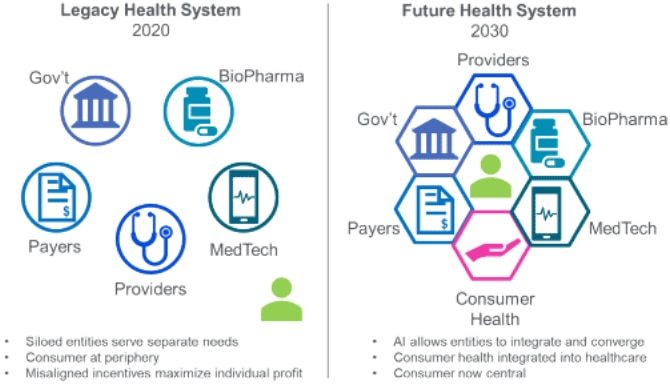
Administration is a part of healthcare that’s often underappreciated by outsiders. It’s also currently very inefficient and therefore ripe for disruption by AI. Here’s why it’s important:
- Excessive cost: Very roughly one-quarter of all spending on healthcare in the US is on administrative tasks, but automation could save perhaps 25-30% of this.
- Burden on clinicians: Burnout is an increasing problem in many health systems globally, including in the US, and more than 90% of clinicians say excessive admin is contributing to burnout.
- Industry fragmentation: Friction in the flow of information means the healthcare system is currently split into distinct entities, e.g., the providers, payers, and government, with little integration among them, and misaligned incentives.
“It’s easy to think that sorting out health admin isn’t that sexy,” according to Dr. Avi Mehra, a co-founder of Doctorpreneurs and CSO in IBM’s health tech team. “But there will probably be more improvement in healthcare provision, for less effort by applying AI to health administration, relative to the clinical side.”
Healthcare Industry -- Fragmentation and Consolidation

© 2023 Citigroup Inc. No redistribution without Citigroup’s written permission.
Source: Deloitte Consulting, Citi Global Insights
AI is already starting to help automate a great deal, and the authors believe that the advent of really good understanding of ordinary language will accelerate this.
“AI presents a large opportunity to help reduce bottlenecks and automate several areas of health admin,” says Elliot Jenks, a managing director at Citi’s investment bank, responsible for health services. “That means you could make a lot of processes much more efficient and lower cost.”
The authors also believe that, in the future, faster information flows among the various parts of the healthcare system will mean they will become more integrated, focusing more and more on the benefits for the consumer.
It is hard to overstate just how burdensome administration is for clinicians. There is unprecedented stress among clinicians following Covid, and poor, disconnected IT is a major factor:
“Clinicians are spending too much time working on admin tasks like pre-authorization scheduling and answering prescription questions that could be automated," says Morgann Carlon, a Health AI leader at Deloitte.
According to one survey of US clinicians:
- 92% of clinicians agree that admin is a major contributor to healthcare worker burnout.
- 36% of clinicians spend more than half their time on administration.
The full report goes on to discuss several other areas, including ambient administration in which a smart AI assistant could listen to the conversation between patient and doctor with the AI behind it and help extract relevant information. It also looks at how AI could improve care for patients, as it can effectively triage, organize, and deliver care to those most in need.
For more information on this subject, and if you are a Velocity subscriber, please see the full report, published on 25 April 2023, here: https://www.citivelocity.com/
And here are the previous reports in this series:
Smart Thinking on AI in Healthcare: Part 1 – Overview
Smart Thinking on AI in Healthcare: Part 2 – Medical Devices
Citi Global Insights (CGI) is Citi’s premier non-independent thought leadership curation. It is not investment research; however, it may contain thematic content previously expressed in an Independent Research report. For the full CGI disclosure, click here.


